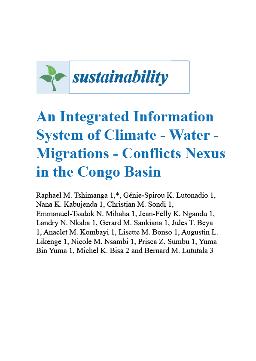Database of the study on the Climate-Water-Migration-Conflict Nexus (CEMiC) in the Congo Basin
Write one or two paragraphs describing your item, services, or specific feature. To be successful, your content must be useful to your readers.
Integrated Information System on the Climate-Water-Migrations-Conflict Nexus in the Congo Basin
This is the document presenting the integrated information system needed to address the nexus between climate, water, migration and conflict in the Congo Basin. It is based on a rigorous and multidisciplinary methodological approach which consists of designing appropriate tools for field surveys and data collection campaigns, data analysis, the creation of a statistical database and the creation of a web interface with the aim of making this information system publicly accessible to users and stakeholders.
Quantitative data
Themes

General information and identification elements
Adapt these three columns to your needs. To duplicate, delete or move columns, select the column and use the icons at the top to perform your action.

Financial inclusion (savings, access to credit and circulation of money)
To add a fourth column, reduce the size of these three columns using the icon on the right of each block. Next, duplicate one of the columns to create a new one as a copy.

Improved economic autonomy of women
.de coin arrondiSupprimez l'image ci-dessus ou remplacez-la par une image qui illustre votre message. Cliquez sur l'image pour changer son style

Property rights, methods of conflict resolution and resilience of...
Adapt these three columns to your needs. To duplicate, delete or move columns, select the column and use the icons at the top to perform your action.

Perception of migration
To add a fourth column, reduce the size of these three columns using the icon on the right of each block. Next, duplicate one of the columns to create a new one as a copy.

Domination over/Control of water resources
.de coin arrondiSupprimez l'image ci-dessus ou remplacez-la par une image qui illustre votre message. Cliquez sur l'image pour changer son style

Water uses
Adapt these three columns to your needs. To duplicate, delete or move columns, select the column and use the icons at the top to perform your action.

Health-hygiene-Sanitation and Environmental Risk Management
To add a fourth column, reduce the size of these three columns using the icon on the right of each block. Next, duplicate one of the columns to create a new one as a copy.

Migration, Insecurity, Conflicts
.de coin arrondiSupprimez l'image ci-dessus ou remplacez-la par une image qui illustre votre message. Cliquez sur l'image pour changer son style

Housing, household assets, household expenditure and food security
Adapt these three columns to your needs. To duplicate, delete or move columns, select the column and use the icons at the top to perform your action.

Transfer of water from the Congo Basin to Lake Chad
To add a fourth column, reduce the size of these three columns using the icon on the right of each block. Next, duplicate one of the columns to create a new one as a copy.

Access to resources and perception of climate change
.de coin arrondiSupprimez l'image ci-dessus ou remplacez-la par une image qui illustre votre message. Cliquez sur l'image pour changer son style

Access to basic social services
.de coin arrondiSupprimez l'image ci-dessus ou remplacez-la par une image qui illustre votre message. Cliquez sur l'image pour changer son style
Qualitative data
Audio and video transcription report
From the investigation into the Climate-Water-Migrations-Conflict Nexus in the Congo Basin: Haut-Uele, Bas-Uele and Ituri

Consult
Thirty (30) transcription sheets produced in connection with the Climate-Water-Migrations-Conflict nexus and gender-related inequalities in the Congo Basin
-
Challenges of integration of Mbororo transhumant herders in the province of Bas-Uele in the DRC
Form N°1 -
Controversial legal status of Mbororo herders: climate refugees or invaders
Form N°2 -
Perception of local leaders on the presence of Mbororo transhumant herders in the Uélé provinces
Form N°3
-
Opinions of natives on the origins of migrant breeders and the great unknowns
FormN°4
-
Role of local authorities in the access of migrant breeders to the national territory
Form N°5 -
Complicity of Mbororo breeders with the forces of evil (LRA), a hidden agenda of the balkanization of the DRC
Form N°6
-
Presence of migrants and challenges for local populations to access basic social services
Form N°7 -
Poverty and precarious social conditions of local communities
Form N°8 -
Migration routes used by Mbororo herders to reach the Congo Basin
Form N°9 -
Security situation and migratory influx of Mbororo transhumant herders
Form N°10
-
Challenges of access to drinking water in the study area
Form N°11
-
Opinions of women on the fragility of agropastoral conflict resolution mechanisms in the study area
Form N°12 -
Perception of climate change and effective presence of migrants in the province of Ituri
Form N°13
-
Regional diplomacy and challenges of water transfer between the Congo River and Lake Chad basins
Form N°14
-
Need for in-depth studies on the mapping of Mbororo migratory routes in the Uélé
Form N°15
-
Discrimination of indigenous Pygmy people in decision-making
Form N°16
-
Climate change and its implication on the living conditions of indigenous Pygmy peoples
Form N°17
-
Climate change, agricultural credit and sexual gender-based violence
Form N°18
-
Perspective of Mbororo migrant herders on the reasons for their migration in the Congo Basin
Form N°19
-
Raising awareness among women about their economic empowerment
Form N°20
-
Climate disruption and its consequences on women's livelihood activities
Form N°21
-
Transhumance of Mbororo herders and pressure on natural resources in the study area
Form N°22
-
Threats from Mbororo herders on the subsistence activities of the local population in the study region
Form N°23
-
Intercommunity conflicts in the study area
Form N°24
-
Presence of Mbororo migrant herders and multiplication of agropastoral conflicts in the Congo Basin
Form N°25
-
Insecurity in production sites for women and girls in the study area
Form N°26
-
On the transhumance of Mbororo herders with their families
Form N°27
-
Conflicts and recruitment of children into armed groups in the study area
Form N°28
-
Perception of civil society organizations on the presence of migrant breeders in the study region
Form N°29
-
Perception of local populations on the origin of migrant herders on transhumance in the study area
Form N°30
